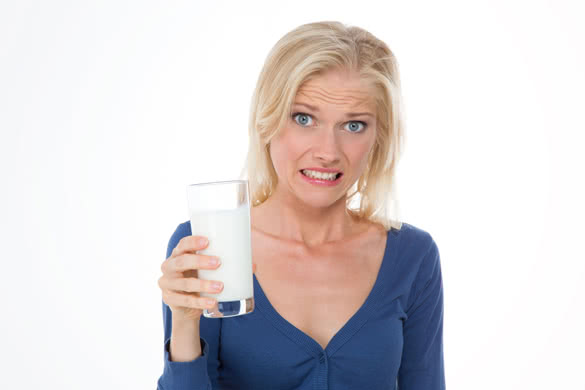Since I was a baby, I’ve had problems drinking milk that comes from an animal. I get a rash, which is an allergic reaction to all milk. As a result, my mother gave me milk formula as a substitute.
To be honest, I don’t mind the rash, but my lactose intolerance is not good. My stomach suffers every time I drink milk from an animal regardless of the animal. I was immediately hooked when I discovered almond milk as I was finally able to enjoy milk without the side effects!
The side effects I experienced happen for a reason, and there are more possible side effects of drinking milk produced by animals. While this article is not intended to scare you, it’s always good to be aware of things that may not be as healthy as we’re led to believe. These are some of the possible side effects associate with the consumption of animal milk.
Risk of prostate cancer

Studies in The American Journal of Clinical Nutrition (Edition 2009) have shown that a higher milk intake increases the risk of prostate cancer. This is particularly true of men who regularly drink more than two servings of milk per day. In contrast, cancer is less likely to develop in those who follow a dairy-free diet.
Risk of ovarian cancer
Studies in the same nutrition journal have shown that a higher milk intake increases the risk of ovarian cancer. Women who drink four or more servings of milk per day are at more risk than women who drink two servings or less daily.
The hormones found in the milk are a big influence for this risk. The cows need to be pregnant so that they can produce milk, and being pregnant means a higher level of hormones. They also have synthetic hormones injected by farmers to produce more milk.
Multiple Sclerosis
People who live in countries that consume a lot of dairy products are at a higher risk of developing multiple sclerosis. These results are based on a 1992 global study called ‘Correlation between milk and dairy product consumption and multiple sclerosis prevalence.’
Cholesterol levels
In some interventional animal and human experiments, the protein present in milk promoted increased cholesterol levels in both people and animals. The results of the animal experiments were published in The Journal of Nutrition (edition 1995) and those of the human experiments were published in the Journal of the American College of Nutrition (edition 2007).
A single serving of milk can contain 24 mg of cholesterol, so imagine if you drink a lot of milk. As we know, high cholesterol is not good for the body, and can cause many health problems, such as heart disease and bad blood circulation.
Acne
A 2009 study called ‘Diet and Acne: a review of the evidence’ showed that a higher milk intake is linked to acne due to the hormones found in milk.
Milk allergies
The 2007 study ‘The Prevalence of Food Allergy: a meta-analysis’ also showed that milk is considered to be the most common food allergen in the world.
Milk allergies, most commonly in young children, are characterized by strong and dangerous reactions, such as vomiting or anaphylaxis. Anaphylaxis is an acute allergic reaction to an antigen (like a bee sting) to which the body has become hypersensitive.
Lactose intolerance
Cows’ milk contains a sugar called lactose. For most people, this sugar is not easy to digest and this difficulty in digesting it can cause symptoms such as: nausea, cramps, gas, bloating or diarrhea. These symptoms tend to worsen with time.
Antibiotics
Many cows are full of antibiotics. This practice is leading to antibiotic resistant bacteria, which may decrease the effectiveness of antibiotics used on humans. In other words, it’s better not to drink milk when you are taking antibiotics.
Weight gain
Milk has extremely high levels of fat, and has been linked to an increase in weight gain at various ages—and let’s not forget about saturated fat. This fat needs to be avoided whenever possible because it can increase the risk of other health problems.
A single serving of milk can contain more than 20 percent of the recommended daily allowance of saturated fat. If you drink three servings of milk per day, you will consume 60% of the recommended daily amount—without including other essential foods.
Bone loss
Instead of promoting bone health, the animal protein in dairy products can have a calcium leaching effect. Also, drinking milk can weaken the overall strength of your bones, increasing your risk for osteoporosis and other bone disorders.
This is based on recent studies that suggest that milk and cheese can be responsible for the development of osteoporosis since the high amount of proteins found in dairy products cause the calcium to separate from the bones.
It’s always good to be informed of the products or foods that we eat or drink, so share this information with your friends and family.
Almond milk is an excellent alternative to animal milk, but there are many other options, too, including: soy, rice, potato, coconut or plantain milk. They all taste much better than dairy milk. To make sure you’re still getting enough calcium, substitute your milk for almonds, mineral water, beans, sardines or fortified cereals.
